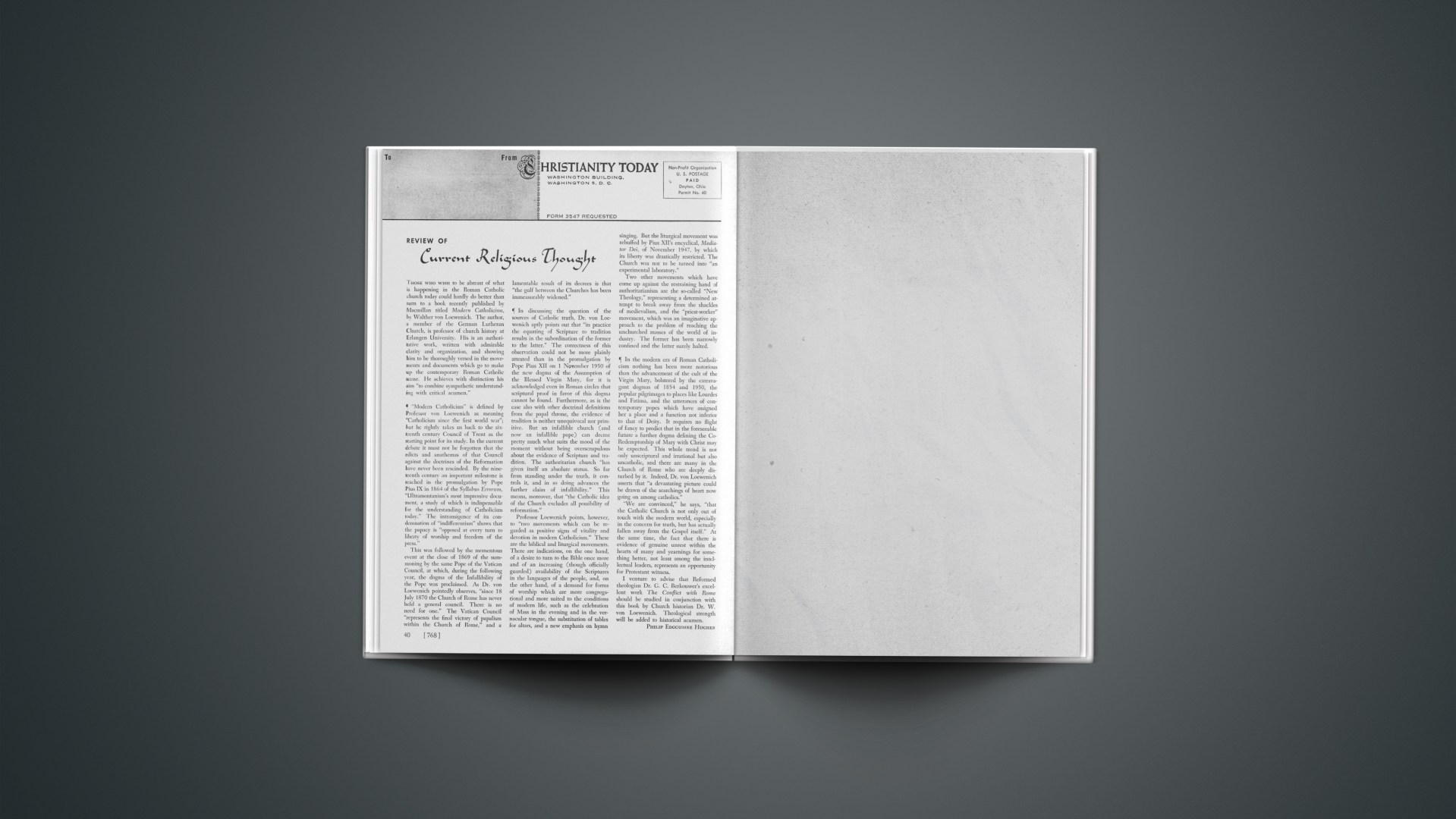Those who wish to be abreast of what is happening in the Roman Catholic church today could hardly do better than turn to a book recently published by Macmillan titled Modern Catholicism, by Walther von Loewenich. The author, a member of the German Lutheran Church, is professor of church history at Erlangen University. His is an authoritative work, written with admirable clarity and organization, and showing him to be thoroughly versed in the movements and documents which go to make up the contemporary Roman Catholic scene. He achieves with distinction his aim “to combine sympathetic understanding with critical acumen.”
“Modern Catholicism” is defined by Professor von Loewenich as meaning “Catholicism since the first world war”; but he rightly takes us back to the sixteenth century Council of Trent as the starting point for its study. In the current debate it must not be forgotten that the edicts and anathemas of that Council against the doctrines of the Reformation have never been rescinded. By the nineteenth century an important milestone is reached in the promulgation by Pope Pius IX in 1864 of the Syllabus Errorum, “Ultramontanism’s most impressive document, a study of which is indispensable for the understanding of Catholicism today.” The intransigence of its condemnation of “indifferentism” shows that the papacy is “opposed at every turn to liberty of worship and freedom of the press.”
This was followed by the momentous event at the close of 1869 of the summoning by the same Pope of the Vatican Council, at which, during the following year, the dogma of the Infallibility of the Pope was proclaimed. As Dr. von Loewenich pointedly observes, “since 18 July 1870 the Church of Rome has never held a general council. There is no need for one.” The Vatican Council “represents the final victory of papalism within the Church of Rome,” and a lamentable result of its decrees is that “the gulf between the Churches has been immeasurably widened.”
In discussing the question of the sources of Catholic truth, Dr. von Loewenich aptly points out that “in practice the equating of Scripture to tradition results in the subordination of the former to the latter.” The correctness of this observation could not be more plainly attested than in the promulgation by Pope Pius XII on 1 November 1950 of the new dogma of the Assumption of the Blessed Virgin Mary, for it is acknowledged even in Roman circles that scriptural proof in favor of this dogma cannot be found. Furthermore, as is the case also with other doctrinal definitions from the papal throne, the evidence of tradition is neither unequivocal nor primitive. But an infallible church (and now an infallible pope) can decree pretty much what suits the mood of the moment without being overscrupulous about the evidence of Scripture and tradition. The authoritarian church “has given itself an absolute status. So far from standing under the truth, it controls it, and in so doing advances the further claim of infallibility.” This means, moreover, that “the Catholic idea of the Church excludes all possibility of reformation.”
Professor Loewenich points, however, to “two movements which can be regarded as positive signs of vitality and devotion in modern Catholicism.” These are the biblical and liturgical movements. There are indications, on the one hand, of a desire to turn to the Bible once more and of an increasing (though officially guarded) availability of the Scriptures in the languages of the people, and, on the other hand, of a demand for forms of worship which are more congregational and more suited to the conditions of modern life, such as the celebration of Mass in the evening and in the vernacular tongue, the substitution of tables for altars, and a new emphasis on hymn singing. But the liturgical movement was rebuffed by Pius XII’s encyclical, Mediator Dei, of November 1947, by which its liberty was drastically restricted. The Church was not to be turned into “an experimental laboratory.”
Two other movements which have come up against the restraining hand of authoritarianism are the so-called “New Theology,” representing a determined attempt to break away from the shackles of medievalism, and the “priest-worker” movement, which was an imaginative approach to the problem of reaching the unchurched masses of the world of industry. The former has been narrowly confined and the latter surely halted.
In the modern era of Roman Catholicism nothing has been more notorious than the advancement of the cult of the Virgin Mary, bolstered by the extravagant dogmas of 1854 and 1950, the popular pilgrimages to places like Lourdes and Fatima, and the utterances of contemporary popes which have assigned her a place and a function not inferior to that of Deity. It requires no flight of fancy to predict that in the foreseeable future a further dogma defining the Co-Redemptorship of Mary with Christ may be expected. This whole trend is not only unscriptural and irrational but also uncatholic, and there are many in the Church of Rome who are deeply disturbed by it. Indeed, Dr. von Loewenich asserts that “a devastating picture could be drawn of the searchings of heart now going on among catholics.”
“We are convinced,” he says, “that the Catholic Church is not only out of touch with the modern world, especially in the concern for truth, but has actually fallen away from the Gospel itself.” At the same time, the fact that there is evidence of genuine unrest within the hearts of many and yearnings for something better, not least among the intellectual leaders, represents an opportunity for Protestant witness.
I venture to advise that Reformed theologian Dr. G. C. Berkouwer’s excellent work The Conflict with Rome should be studied in conjunction with this book by Church historian Dr. W. von Loewenich. Theological strength will he added to historical acumen.









